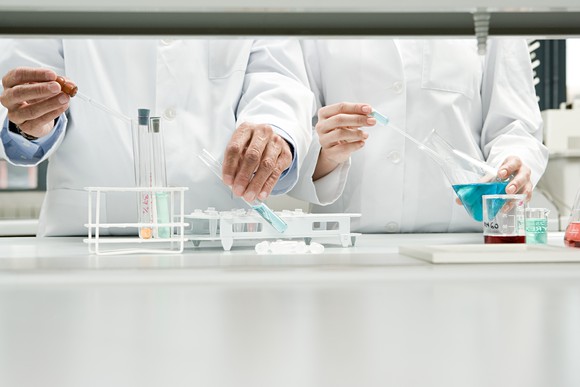By most metrics, Celgene Corporation (NASDAQ:CELG) is smaller than Bristol-Myers Squibb (NYSE:BMY). Celgene has fewer employees, lower revenue, and lower earnings than BMS does. In one key way, though, Celgene is the bigger drugmaker: Its market cap is greater by several billion dollars.
This one outlier is a result of Celgene's tremendous stock performance. Shares have soared more than 250% in the past five years compared to BMS stock's gains of around 90% during the same period. But which of these two big pharma companies is the better choice for investors now? Here's how Celgene and Bristol-Myers Squibb stack up in several key areas.

IMAGE SOURCE: GETTY IMAGES.
Current products
Celgene's top product, Revlimid, is on pace to generate revenue of close to $8 billion in 2017. Sales for Revlimid continue to grow by nearly 20% annually. Market research firm EvaluatePharma predicts that Revlimid will become the best-selling cancer drug in the world in the next few years.
There's a big gap between Revlimid and the second tier of Celgene's current products. Another blood cancer drug, Pomalyst, should pull in sales in the ballpark of $1.5 billion this year. Sales for psoriasis and psoriatic arthritis drug Otezla should come in close to that level this year. However, Otezla's momentum is so strong that it will probably edge out Pomalyst as Celgene's No. 2 product within the next year or two.
Celgene also has another cancer drug knocking at the door of the $1 billion sales level with Abraxane. Sales for the biotech's older products, including Vidaza, Istodax, and Thalomid, are slowing -- but they still should combine for close to $900 million in revenue in 2017.
For BMS, the crown jewel is Opdivo. It's on track to rake in $4.7 billion or more in sales this year. Opdivo also appears likely to come in second behind Revlimid among the top-selling cancer drugs in the world within the next five years.
Close behind Opdivo in Bristol-Myers Squibb's current lineup is Eliquis. The anticoagulant should generate sales of around $4.5 billion in 2017. BMS also claims three other blockbuster drugs in what the company calls its "prioritized brands": immunotherapy Yervoy, chemotherapy Sprycel, and rheumatoid arthritis drug Orencia.
The challenging area for BMS is with its established brands. Sales are plunging for its hepatitis C drugs. The company is also seeing significant revenue declines for its other antiviral drugs, including Baraclude, Sustiva, and Reyataz.
Overall, the clear advantage for current product lineup goes to Celgene. Its top drugs are showing strong growth, while its older drugs are experiencing only small sales declines at this point.
Pipelines
Celgene's pipeline is loaded with potential stars. The biotech expects results from 19 late-stage clinical studies by the end of next year with eight programs advancing to pivotal trials. Celgene believes that it has 10 candidates on track for approval by 2022 that could generate peak sales of $1 billion or more.
Five of those pipeline candidates especially stand out. Ozanimod is at the top of the list. The drug is in late-stage studies targeting relapsed multiple sclerosis and ulcerative colitis. GED-0301 is another autoimmune disease drug that could be be approved within the next couple of years. Celgene is also hoping to expand its dominance in treating blood diseases with luspatercept, CC-220, and other experimental drugs.
Bristol-Myers Squibb has 34 programs in clinical development. Most of BMS' new pipeline candidates are in early- or mid-stage studies, while its late-stage efforts focus largely on additional indications for drugs already on the market.
The company is also evaluating multiple combinations with Opdivo and Yervoy. Much of BMS' pipeline hopes rest on successful combos of immunotherapies with other drugs in treating various forms of cancer. There's reason to be cautiously optimistic about these combos: BMS recently announced good news from a late-stage study of a combination of Opdivo and Yervoy in treating renal cell carcinoma.
Celgene again emerges as the winner. It has a deeper pipeline with more candidates that should have good shots at becoming blockbusters over the next few years.
Financials
Celgene reported cash, cash equivalents, and short-term investments of a little over $10 billion at the end of the second quarter. The company has around $14 billion in debt. Revenue and earnings are both growing briskly.
BMS had a cash stockpile of roughly $6.5 billion at the end of the second quarter, with a debt of around $8 billion. Revenue is growing overall, but only by single-digit percentages. Earnings fell in the last quarter compared to the prior-year period. Unlike Celgene, however, BMS pays a dividend, which currently yields 2.4%.
The dividend for BMS is nice. However, I have to yet again give the nod to Celgene. The biotech's financial position appears to be better overall.
Better buy
It's probably no surprise that I view Celgene as the better buy between these two stocks. The biotech has a strong blood cancer franchise led by Revlimid. It's expanding on the success of Otezla with new autoimmune disease drugs on the way. Continued momentum for its current drugs and a promising pipeline should translate to strong revenue and earnings growth in the years to come. Celgene is the clear winner.
Say Goodbye to the Old iPhone: This Could Be 40X BetteriPhone mania is back, and there's potentially billions up for grabs. But if you think Apple is the best way to play the pending iPhone tsunami, think again. One tiny company holds the patents to an invaluable, tiny component inside Apple's newest iPhone -- and Apple has to pay up every time it puts this technology in its phones.
Don't wait until the name of this company is on everyone's lips.















